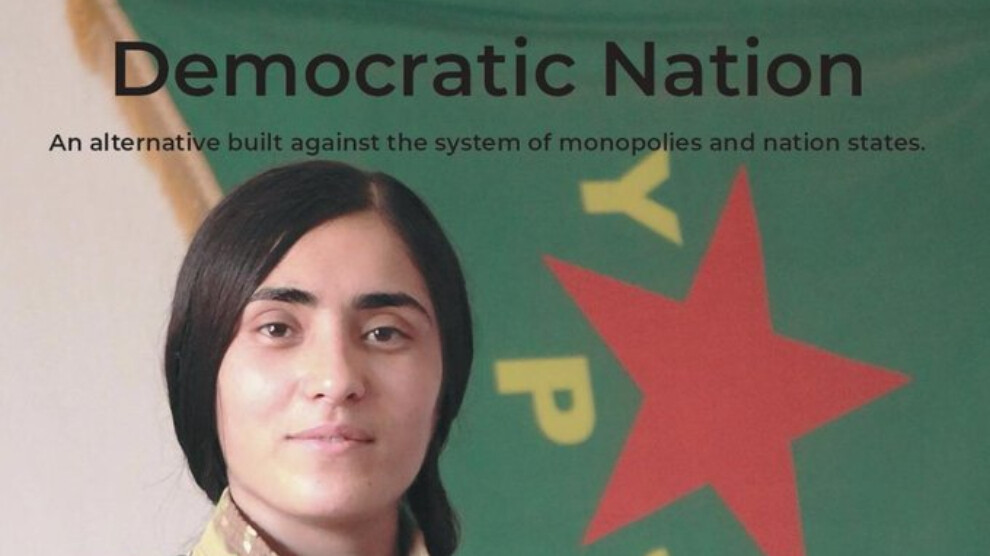YPJ fighters: Democratic Nation is an alternative against the system of monopolies and nation states
YPJ fighters of different national identities speak about their life, choices and beliefs.
YPJ fighters of different national identities speak about their life, choices and beliefs.

According to Abdullah Öcalan, "The definition of a democratic nation that is not bound by rigid political boundaries, one language, culture, religion and interpretation of history, signifies plurality and communities as well as free and equal citizens existing together and in solidarity. The democratic nation allows the people to become a nation themselves, without resting on power and state, becoming a nation through much needed politicisation. It aims to prove that not only through politicisation but also, in the absence of becoming a state or acquiring power, a nation can be created with autonomous institutions in the social, diplomatic, and cultural spheres as well as in economy, law and self-defence, and thus build itself as a democratic nation."
In Rojava, a revolution is happening on the basis of a long-term struggle of the people. It started more than ten years ago, and since then the life of society has fundamentally changed. One of the aspirations of this revolution is to propose a solution to the Kurdish Question, to the problems of the Middle East, and for a democratic transformation in general. It has been achieved by the continued struggle of the people and, at its core, by the liberation struggle of women. It has been recognized worldwide by democratic movements and individuals. In those years, the society has changed a lot and it is always important to understand those transformations. One of the core issues that the Middle East faces today is how to overcome the politics of oppression, assimilation, and genocide: a solution to those problems ultimately also means building an alternative to the nation-state system. The centralization of the nation state is linked to the development of capitalism, because capitalism centralizes power in monopolies and intensifies fanatical ideas of nation-hood to an end point that inhibits diversity. In his writings, Abdullah Ocalan criticizes the positivist mentality that approaches any phenomenon in a strictly analytical way – an approach that opens the way to genocidal politics when it comes to the question of nations. At the same time, he criticizes attitudes that limit their understanding of the problem of nationhood to a purely constructed or theoretical phenomenon. Instead, he emphasizes the necessity to analyze the problem, its historical roots and its systematics. To overcome it, he proposes the paradigm of the Democratic Nation, which clarifies that, first and foremost, the aim of society is to develop morally and politically.
The struggle to achieve this transformation, subsequently, involves women’s liberation and developing an ecological way of life. It means overcoming the mentality of dividing everything into parts. Instead of the nation state, Abdullah Ocalan proposes the creation of a common life and self-administration for all ethnicities, religions and societal groups present in the region that, at the same time, offers everyone the opportunity to keep their autonomy and self-define their lives. Because women have been the strongest transformative force in the revolution and because their approach is very flexible and open-minded, they have managed to be the pioneers of overcoming national, ethnic, and religious boundaries. In North and East Syria, the paradigm of the democratic nation is developing in practice. It was our struggle as YPJ that opened the way for this change. Inside the ranks of our forces, women from all kinds of religious and ethnic backgrounds take part, educate themselves about the paradigm of a democratic nation, and organize according to it.
For many, this has meant great personal changes of attitude and has truly transformed the backward mindsets that we have all been raised with to some greater or lesser degree. Practically, this has become a reality today: a big part of the YPJ consists of Arabic women and women of Christian, Yazidi or other origins. They all organize in order to live out the truth of their own identities and to commonly struggle for freedom. We can see this in the brave personalities of young women today. They overcome the burdens of traditions and capitalist nation-states and create alternatives. We have met several of our friends in the YPJ who are going through this process. They have taken up roles in the self-defense of their common homeland, in units of heavy weapons, in operation forces, in the media, and in the organization of the revolutionary people’s war. But first and foremost, they took on the responsibility to change themselves and society. To show this, we have interviewed four of them. Every one of them represents a part of the YPJ’s lived reality and history.